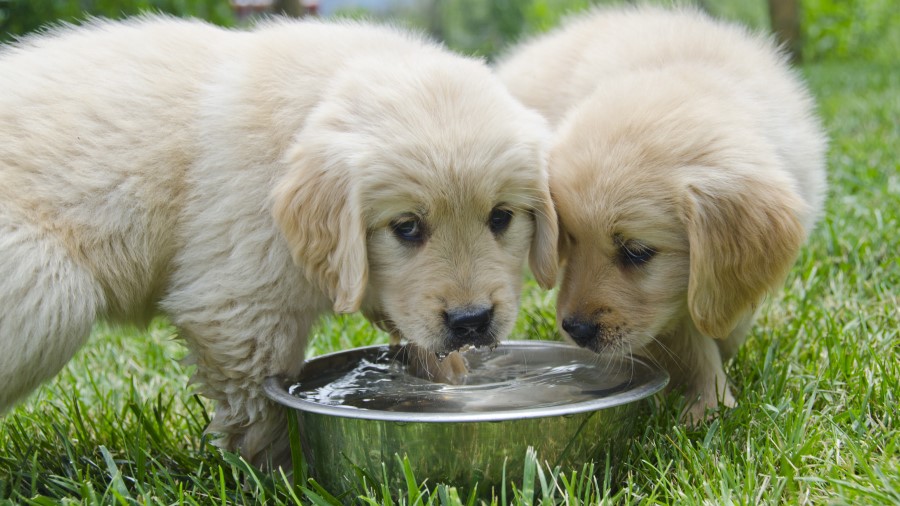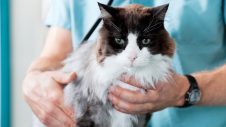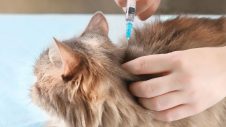Parvovirus in dogs, also known as parvo or canine parvovirus, is a highly contagious virus that affects unvaccinated and partially vaccinated dogs. Puppies are often most at risk. The most obvious signs of parvovirus are gastrointestinal – affected dogs are lethargic with vomiting, diarrhoea and appetite loss.
Please ensure your dog’s vaccinations are up to date, contact your local Greencross Vets clinic today.
What does parvovirus do?
Parvovirus attacks the lining of the small intestine, and leads to severe vomiting and diarrhoea, often with blood. Parvovirus can cause severe dehydration, shock and death in severe cases. The destruction of the gut lining by parvovirus is so severe that it takes several days for the gut to regain digestive function and water balance. At the same time, the virus also attacks the bone marrow. The damaged bone marrow can no longer produce enough white blood cells needed to fight off infections, and this makes the disease even more serious. In some cases, parvovirus in dogs can also affect the heart resulting in inflammation and this is usually fatal.
How do dogs get parvo?
Parvovirus is highly contagious and can survive for long periods in the environment. The virus can withstand routine cleaning and weather changes, which means the spread of the virus is hard to control. It can be easily transferred from the paws of dogs and from people’s shoes or other items contaminated with the virus, like bedding or leashes. Parvovirus is shed in the faeces of infected animals, and dogs easily come into contact with these when sniffing the ground when on walks or at the dog park. It is important to understand that you don’t need direct dog-to-dog contact for a dog to become infected with parvovirus.

What are the Parvovirus symptoms
If you suspect your dog may have parvovirus, there are a few symptoms to be on the lookout for:
- Loss of appetite
- Lethargy
- Abdominal bloating and pain
- Vomiting
- Diarrhea (which may contain blood)
- Changing body temperature (fever or a lower temperature)
How to prevent parvovirus in dogs
Vaccinating your pet against parvovirus is the only way to protect them from the disease. Vaccinations work to trains their immune systems to recognise the viral markers for parvovirus. The vaccination is highly effective and very safe. Puppies require vaccination based on the following:
Parvo Vaccination Schedule:
This may change depending if you are living in a parvovirus endemic area.
- Initial vaccine at 6 to 8 weeks of age
- Booster vaccine at 10 to 12 weeks old
- Booster vaccine at 14 to 16 weeks old
- A booster vaccination one year after finishing the puppy series of vaccinations
- Subsequent vaccinations are based on your vet’s recommendations, considering the dog’s age and lifestyle.
Remember, your puppy will not have full immunity against the virus until two weeks after their final puppy vaccine. This means that even after their last puppy vaccination, you should wait an additional two weeks before socialising them at dog parks or with dogs you don’t know the vaccination status of.
How many parvo shots does a puppy need?
In total, as part of their vaccination schedule, puppies should receive 3 vaccinations within the first 16 weeks of their life. In addition to this, your vet will recommend booster vaccinations as needed, typically every 1-3 years though this can depend on the type of vaccination your puppy receives. This may change slightly if you are in a parvovirus area.
Additional measures to protect your pet include:
- Promptly dispose of faeces on walks to reduce environmental contamination and as part of being a responsible pet owner
- Regularly wash bedding and food/water dishes until your dog is vaccinated
- Follow the vaccination schedule as discussed with your vet
- Don’t walk puppies in parks and outside your home until they receive their full complement of puppy vaccines
How is parvovirus treated?
This virus is typically seen in young unvaccinated puppies, but older unvaccinated dogs can become infected too. A test is available that can detect the presence of the virus in faeces. If parvovirus is suspected based on the clinical signs, your vet will perform this test to confirm infection.
Signs of parvovirus infection progress rapidly, and the disease can be fatal within 48 hours if not treated. Treatment requires hospitalisation over several days, with supportive care including intravenous fluids, antibiotics, pain relief and medications to stop vomiting. In some instances, puppies may require more intense critical care treatment including plasma or blood transfusions.
Ensuring puppies are getting the nutrients they need is another key part in helping them stay strong enough to fight the disease. and In some cases dogs who lose their appetite or are unwilling to eat may require assistance with a feeding tube. Protein levels, red blood cells and serum electrolytes are monitored and nutrition support tailored to each patient. Even with intensive treatment some dogs may succumb to this horrible disease.
For more information on protecting your pet from parvovirus and other contagious diseases, contact your local Greencross Vets.
Parvovirus FAQs
What is parvovirus in dogs?
Parvovirus is a disease that primarily attacks the lining of the small intestine, bone marrow and in some cases can cause heart inflammation. All of these can lead to vomiting, diarrhoea, severe dehydration, shock and death, especially in puppies and partially vaccinated dogs.
How do dogs get parvovirus?
One of the biggest issues with parvovirus is how contagious it is. There is no need for direct dog-to-dog contact for a dog to become infected. The disease can be transmitted in faeces of infected animals, as well as on dogs’ paws, peoples’ shoes, bedding and leashes. The virus is very hardy and extremely resilient in the environment.
How to treat parvovirus in dogs
The best treatment for parvovirus in dogs is prevention. Ensuring your puppy is fully vaccinated against the disease is crucial, and limiting their outside adventures until this time is key to reduce the risk of them coming into contact with the virus. If you notice any parvovirus symptoms in your unvaccinated dog, and especially in puppies, you should see your vet immediately.
How is parvovirus transmitted in dogs?
The virus is mostly transmitted via direct contact with an infected dog, but because it is so highly contagious it can also spread to your dog indirectly, through contact with contaminated surfaces, public paths and walkways, food and water bowls, clothing, shoes or dog leads. Transmission, therefore, easily occurs without direct dog-to-dog contact.
How to avoid parvovirus in dogs
Ensure your puppy receives their full course of puppy vaccinations correctly and on time, and receives booster shots if and when they need them. Do not take your puppy out in public or allow them to socialise with other dogs before they are fully vaccinated.
Is parvo contagious to humans?
As the parvovirus that affects humans is a different type of virus than the one that is transmitted amongst dogs, the canine parvovirus is not contagious to humans.

 Greencross Vets
Greencross Vets 








